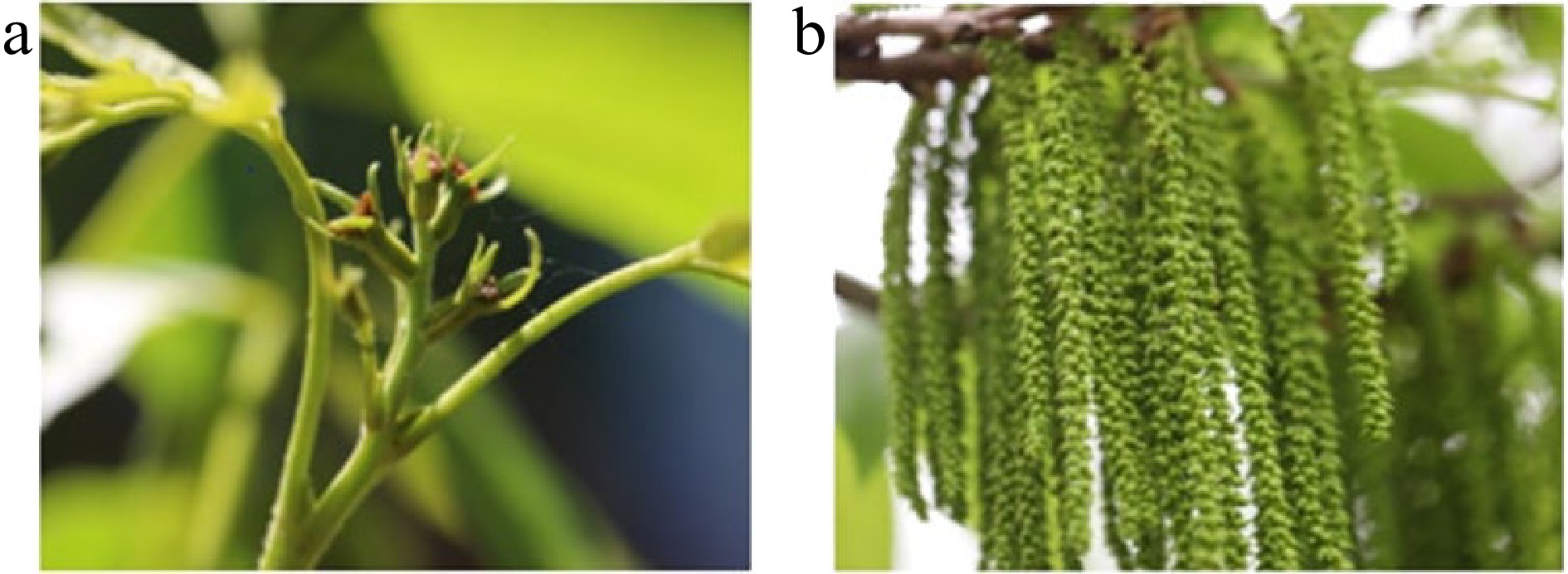-

Figure 1. (a) Pecan pistillate flowers; (b) pecan staminate flowers.
-
S. No. PGRs Fruit/nut crop Effects Reference 1 Ethephon Sweet cherry Delay bloom 3-5 days, Reduced spring freeze injury and increased yield Proebsting and Mills[56] 2 Ethephon GA Victoria plum Ethephon and GA delays bloom for 1−13 days, yield double in 1981 and 14 times in 1982 Individual application of GA and ethephon have variable results No detrimental effect on fruit quality or maturity by both regulators Webster[57] 3 Ethephon Apricot and Peach Delayed bloom in both crops Reduced yield in untreated Apricot after frost of −4 °C Less damage in treated peach as compared to untreated Fruit set not affected or slightly increased Buhan & Turi[58] 4 Ethephon ‘Empress’ peach Delayed bloom No effect on Bloom density, harvest date Ebel et al.[59] 5 Ethephon Peach and Prune Delayed bloom Reduced yield in peach In prune, higher yield after treatment year even after frost at full bloom stage, while reduced yield after treatment year when no frost occurred Crisosto et al.[60] 6 Ethephon Almond Not recommended for almond in Mexican warm climate Grijalva-Contreras et al.[61] Table 1. Summary of exogenous hormone (Ethephon) studies on growth and development of tree crops.
-
S. No. PGRs Fruit/nut crop Effects Reference 1 PBZ Cashew Treatment inhibited the taproot growth and promoted the growth of the lateral root, Treated grafts showed normal growth when planted in the field Misra and Singh[75] 2 PBZ Cashew Reduced plant height, canopy spread, and intermodal length An increase in the number of flushes with a yield increase up to 51.78% Meena et al.[76] 3 PBZ Mango Significant difference on the time to flowering, percentage of flowering shoots, and panicle length PBZ at 2,000 mg/L were caused stunting of flushes and panicle malformation Wongsrisakulkaew et al.[77] 4 PBZ Peach Significantly reduced the competing spring shoot growth and resulted in earlier maturity of a greater crop of larger, better quality fruits. Allan et al.[78] 5 PBZ Apricot Significantly reduced vegetative growth Lower total pruning dry weight, shoot growth and trunk cross sectional area of treated trees than controls. Fruit load, crop density and total soluble solids of fruits were not affected by PBZ compared with the control. Arzani and Rousta[79] Table 2. Summary of exogenous hormone (PBZ) studies on growth and development of tree crops.
Figures
(1)
Tables
(2)